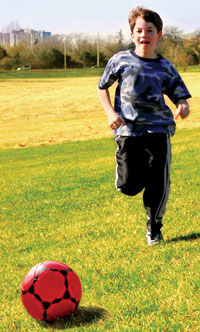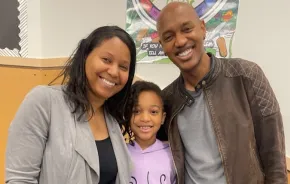Four years ago, when my oldest son joined his first organized sports team, I was so wrapped up in my own world that I barely noticed the coach and his responsibilities.  After all, I had two children, sports equipment, cold-weather gear and a folding chair to tote onto the field for each practice. Now, with experience as both a parent and a coach, I have a new appreciation for the work involved. It turns out that coaches also have children, sports equipment and cold-weather gear to carry — but they definitely don’t have use for that folding chair.
After all, I had two children, sports equipment, cold-weather gear and a folding chair to tote onto the field for each practice. Now, with experience as both a parent and a coach, I have a new appreciation for the work involved. It turns out that coaches also have children, sports equipment and cold-weather gear to carry — but they definitely don’t have use for that folding chair.
Organized sports for younger children are on the rise, with sports teams available all the way down to the preschool level. With the younger players, it is common for the coach to be a parent of a child on the team. Why do these parents volunteer to coach? They may want to spend quality time with their own children, give back to the community or just love to teach. As Mukilteo T-ball and soccer coach Mary Dixon explains, “I enjoy kids, it’s fun, I’m there anyway, and I have a good ability to connect with kids.”
How can you help?
When asked what they want from the parents, most coaches give the same answer: a little understanding for them, encouragement for the kids and an offer to help.
Try these tips for supporting both your child and the coach to make it a positive experience for everyone.
Take on an official role with the team. There is always more than enough work to go around: assistant coach, team parent, snack coordinator, even the end-of-season party planner.
“With youth sports, coaching is a team event,” says Mukilteo baseball coach Lenny Mickelson. If you’ve ever watched a group of kids just learning a sport try to come together as a team, you know how hard it can be to manage alone.
Look for opportunities to help. Perhaps the coach has a conflict getting to practice early to set up the field or needs assistance with telephone calls due to last-minute weather changes. Lending an extra hand cleaning up the field and carrying the equipment back to the car is always appreciated. “Don’t wait to be asked,” says Mukilteo baseball coach Skip Lee. “If you see something that needs doing, do it. If you’re not sure, ask.”
Send your child with the proper equipment. In the early years, very little is required, but if she needs a ball or mitt, make sure she shows up with it every time. Also, commit to being there on time and notify the coach if you can’t make it to games or practice.
Give your child time to practice at home. Remember that your time and commitment can have a big influence on your child’s enjoyment and progress. Practice doesn’t have to be anything formal — just spend time with him in the backyard to practice the skills he is learning. Lee suggests that parents not say: “Time for practice, you need to throw for half an hour,” but rather: “Hey Billy, let’s go play catch!” Even if you don’t have the skills to play a particular sport with your child, you can still participate. Mickelson acknowledges that his own children play some sports he knows little about, but he is still there to encourage them.
Energize your child with appropriate nutrition and water. Feed your child enough before practice and games so he won’t lose energy, and provide a water bottle to keep him hydrated. According to the American Academy of Pediatrics, “Athletes need to drink 4 to 8 ounces of water every 15 to 20 minutes during activity.” Plain water is best, but a sports drink will do.
Cheer, don’t coach, your child. Your child already has a coach — you are there to be her number-one cheerleader. As Dixon points out, “Parents should be encouraging their kids and need to be careful of too high of expectations.”
Keep your expectations age-appropriate. Not all kids are ready for organized sports at the same age, so don’t push your child into joining a team too early. According to the American Academy of Pediatrics, “Teaching or expecting these skills to develop before children are developmentally ready is more likely to cause frustration than long-term success in the sport.”
Throughout the season, remember to show the coach your appreciation for her time, energy and patience. Asked what her favorite expression of gratitude is, Dixon didn’t hesitate for a moment when she said it was “at the end of a season, when a little one comes up with a grin and says, ‘Thank you so much, Coach Mary!’”
Erika Parker Price lives in Mukilteo with two active boys who have been on many teams.









